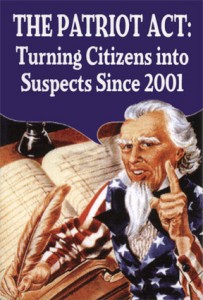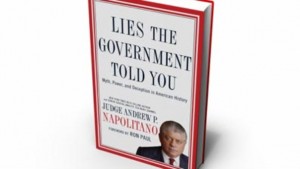EDITOR’S NOTE: At the recent GOP debate on CNN, the Patriot Act was the lead subject. Newt Gingrich told viewers that the act wasn’t strong enough. Herman Cain was willing to get rid of some it, but wasn’t willing to “throw the baby out with the bath water.” Candidate after candidate referred to the Patriot Act as good, neceesary, and something they would most-certainly be in favor of keeping, or strengthening. Ron Paul was the only candidate with the courage to say that the Patriot Act is both a violation of liberty and the constitution. Reinforcing this correct view – we present the following column on the Patriot Act, written by Judge Andrew Napolitano on December 16, 2005.
Congress once respected the Fourth Amendment until it began cutting holes in it. Before Congress enacted the Foreign Intelligence Surveillance Act (FISA) in 1977, Americans and even non-citizens physically present here enjoyed the right to privacy guaranteed by the Fourth Amendment. That Amendment, which was written out of a revulsion to warrants that let British soldiers look for any tangible thing anywhere they chose, specifically requires that the government demonstrate to a judge and the judge specifically find the existence of probable cause of criminal activity on the part of the person whose property the government wishes to search. The Fourth Amendment commands that only a judge can authorize a search warrant.
FISA unconstitutionally changed the probable cause of criminality requirement to probable cause of employment by a foreign government, hostile or friendly. Under FISA, if the government can demonstrate the foreign agency or employment status of the person whose things it wishes to search, the secret FISA court will issue the search warrant.
But even FISA respects constitutional liberty, since it prohibits prosecutions based on evidence obtained from these warrants. Thus, if a FISA warrant reveals that the embassy janitor is really a spy who beats his wife, he would not and could not be prosecuted for either crime because the evidence of his crimes was obtained in violation of the Fourth Amendment’s requirement of a judicial finding of probable cause of criminal activity. Instead of being prosecuted, he would be deported.
A year later in 1978, cutting yet another hole in the Fourth Amendment, Congress revealed its distaste for fidelity to the Constitution and its ignorance of the British government’s abuse of the colonists by enacting the Orwellian named, Right to Financial Privacy Act. This statute, for the first time in American history, let federal agents write their own search warrants, but limited the subjects of those warrants to financial institutions. Just like FISA, it recognized the unconstitutional nature of evidence obtained by a self-written search warrant, and banned the use of such evidence in criminal prosecutions.
In 1986, Congress continued to cut. It disregarded yet again the Fourth Amendment’s protection of privacy when it enacted the Electronic Communications Privacy Act which allowed federal agents to serve self-written search warrants on collectors of digital financial data, but continued to recognize that evidence thus obtained was constitutionally incompetent for criminal prosecution purposes.
The deepest cut came on October 15, 2001 when Congress enacted the Patriot Act. With minimal floor debate in the Senate and no floor debate in the House (House members were given only 30 minutes to read the 315 page bill), Congress enacted this most unpatriotic rejection of privacy and constitutional guarantees. Together with its offspring the Intelligence Authorization Act for Fiscal 2004 and the Intelligence Reform Act of 2004, the Patriot Act not only permits the execution of self-written search warrants on a host of new subjects, it rejects the no-criminal-prosecution protections of its predecessors by requiring evidence obtained contrary to the Fourth Amendment to be turned over to prosecutors and mandating that such evidence is constitutionally competent in criminal prosecutions.
The new version of the Patriot Act which the Senate will debate this weekend purports to make all of this congressional rejection of our history, our values, and our Constitution the law of the land.
So, if your representative in the House has voted, or your Senators do vote, for the House/Senate conference approved version, they will be authorizing federal agents on their own, in violation of the Constitution, and without you knowing it, to obtain records about you from your accountant, bank, boat dealer, bodega, book store, car dealer, casino, computer server, credit union, dentist, HMO, hospital, hotel manager, insurance company, jewelry store, lawyer, library, pawn broker, pharmacist, physician, postman, real estate agent, supermarket, tax collectors, telephone company, travel agency, and trust company, and use the evidence thus obtained in any criminal prosecution against you.
Why would Congress, whose members swore to uphold the Constitution, authorize such a massive evasion of it by the federal agents we have come to rely upon to protect our freedoms? Why would Congress nullify the Fourth Amendment “guaranteed right to privacy for which we and our forbearers have fought and paid dearly? How could the men and women we elect to fortify our freedoms and write our laws so naively embrace the less-freedom-equals-more-security canard? Why have we fought for 230 years to keep foreign governments from eviscerating our freedoms if we will voluntarily let our own government do so?
The unfortunate answer to these questions is the inescapable historical truth that those in government from both parties and with a few courageous exceptions do not feel constrained by the Constitution. They think they can do whatever they want. They have hired vast teams of government lawyers to twist and torture the plain meaning of the Fourth Amendment to justify their aggrandizement of power to themselves. They vote for legislation they have not read and do not understand. Their only fear is being overruled by judges. In the case of the Patriot Act, they should be afraid. The federal judges who have published opinions on the challenges to it have all found it constitutionally flawed.
The Fourth Amendment worked for 200 years to facilitate law enforcement and protect constitutional freedoms before Congress began to cut holes in it. Judges sit in every state in the Union 24/7 to hear probable cause applications for search warrants. There is simply no real demonstrable evidence that our American-value-driven-constitutional-privacy-protection-system is in need of such a radical change.
A self-written search warrant, even one called a national security letter, is the ultimate constitutional farce. What federal agents would not authorize themselves to seize whatever they wished? Why even bother with such a meaningless requirement? We might as well let the feds rummage through any office, basement, computer, or bedroom they choose. Who would trust government agents with this unfettered unreviewable power? The Framers did not. Why would government agents bother going to a judge with probable cause seeking a search warrant if they can simply write their own? Big Brother must have caught on because federal agents have written and executed self-written search warrants on over 120,000 unsuspecting Americans since October 2001.
Is this the society we want? Have we ultimately elected a government to spy on all of us? The Fourth Amendment is the lynchpin of our personal privacy and individual dignity. Without the Fourth Amendment’s protections, we will become another East Germany. The Congress must recognize this before it is too late.
Andrew P. Napolitano [send him mail], a former judge of the Superior Court of New Jersey, is the senior judicial analyst at the Fox News Channel, and the host of FreedomWatch on the Fox Business Network. His latest books are Lies the Government Told You: Myth, Power, and Deception in American History, (Nelson, 2010), and his newest release, It is Dangerous to be Right When the Government is Wrong: The Case for Personal Freedom.
Copyright © 2011 Andrew P. Napolitano


